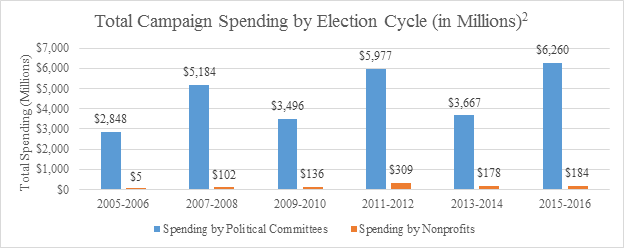Last Wednesday, The Washington Post’s Jonathan Capehart wrote a noteworthy piece criticizing former Republican Speaker of the House Newt Gingrich for his inane statements regarding former New York City mayor, Michael Bloomberg. Gingrich said that he, “[had] every problem with Mayor Bloomberg being able to buy the election in New York” – a claim that would be laughable were it not such a common refrain. Capehart rightly takes the former Speaker to task, defending Bloomberg’s three mayoral victories, all of which were won not with dollars, but with the votes of New York City residents.
Money does not “buy elections.” And, despite Mr. Gingrich’s protestations, nothing proves this point better than the innumerable failed campaigns of self-funded candidates. Indeed, the Post article runs through a lengthy list of examples of the hundreds of millions spent by wealthy candidates who, nonetheless, failed to win over voters.
This phenomenon occurs with such frequency that in this 2014 primary season, we have already seen numerous additional examples where using one’s personal fortune to outspend his or her opponents does not translate into votes.
In the recent Iowa GOP Senate primary, former Reliant Energy executive Mark Jacobs spent almost three million dollars of his personal fortune and outspent his opponent, relatively unknown State Senator Joni Ernst, four to one. Despite this, Ernst won over half the vote, and Jacobs earned less than one-fifth. A folksy state senator who used to castrate hogs was more appealing to Iowa voters than Jacobs’ spending.
Over on Long Island, in New York’s First Congressional District, former Securities and Exchange Commission lawyer George Demos donated two million dollars of his family’s personal fortune in order to lose by nearly 25 points to Iraq War veteran Lee Zeldin (who spent less than $600,000). And in America’s Heartland, in Oklahoma’s Fifth District, 27-year-old trust fund candidate Mike Turner accounted for nearly half of all spending by candidates in a four-way race, but earned just 14 percent of the vote.
But there is a more important lesson here than money doesn’t buy elections (and it is not just that Newt Gingrich is wrong, either). What the aforementioned races show is that these candidates were able to speak to voters and promote their message through their own means – and the majority of them had that message rejected by the voters because it didn’t resonate. No amount of spending can force a voter to agree with a candidate’s message.
When individuals decry money in politics – whether Newt Gingrich or Harry Reid – they are decrying the right to speak, the right to say to voters “this is what I believe, you should vote for me,” and the right for voters to hear that message and vote for the other guy. To aver that “money buys elections” rejects this fundamental reality of voter choice and, as Capehart points out, “to say otherwise is an insult to voters.”
Primarily self-funded candidates who continually lose their elections epitomize this fundamental part of our democracy – voters do not care how much money you spend on your TV and radio ads, they care what the ads actually say – and vote accordingly.














